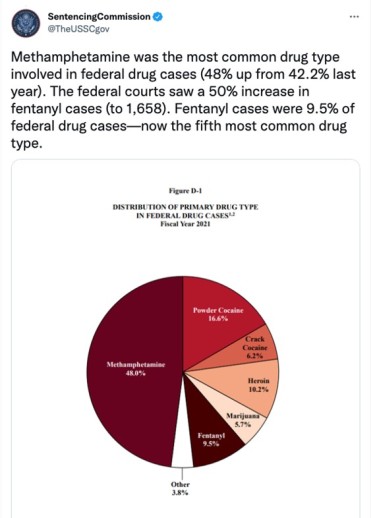
State-wide marijuana arrests are falling as legalization increases from state to state
The U.S. Criminal Commission just released its 2021 annual report, in which federal officials announced that fewer people were charged with cannabis-related crimes in that year compared to previous years.
Last year, just fewer than 1,000 people were charged with violating marijuana laws, accounting for less than 6% of people charged with violating federal drug laws. Compared to 2012, when nearly 7,000 were convicted by the FBI for marijuana crimes, this is certainly a big step up. Then, in 2020, 1,118 cannabis indictments were registered by the USCC.
This means that cannabis is no longer as important to law enforcement officers as it should be, as legalization of the plant continues to spread across the country and the FBI has implemented policies to lower the priority of catching people committing cannabis crimes. The annual decrease in cases is consistent with the increase in states that have legal cannabis laws. Consumers now have more legal ways to purchase cannabis than ever before, so there are far fewer reasons for them to resort to criminal methods to obtain cannabis. It also reflects how the federal government is slowly deprioritizing cannabis cases while support for cannabis legalization is at an all-time high.

“Although Congress has failed to change federal cannabis laws, the attitudes and priorities of federal prosecutors have clearly changed in the age of state-level marijuana legalization. Now is the time for federal lawmakers to codify these changes in priorities by removing marijuana from the program,” said Paul Armetano, associate director of NORML.
“Despite this downward trend in marijuana prosecutions, America’s outdated federal laws still have a significant and unnecessary impact on people’s lives. Congress has the power to change that. Legislature must continue to gain momentum to end our failed marijuana prohibition policy and help those unjustly hurt by it. We urge House Speaker Nancy Pelosi to vote immediately on the Marijuana Opportunity, Reinvestment, and Expunge Act, and sincerely hope that Senate Majority Leader Chuck Schumer will support his proposed introduction of the Cannabis Administration and Opportunity Act in the April,” added Morgan Fox, NORML Political Director.
The House Rules Committee just announced that there will be a hearing on the Marijuana Opportunity Reinvestment and Expungement Act, which, if it goes well, should be the last necessary step before the House considers the bill. If passed, it would permanently remove marijuana from the list of federally controlled drugs while eliminating the criminal penalties associated with being caught using marijuana. Additionally, the bill would levy federal taxes on cannabis sales so programs in communities hard hit by the War on Drugs could instead help people.
“I have long believed that criminalizing marijuana was a mistake. Racially disparate enforcement of marijuana laws has only made it worse, with serious consequences, particularly for communities of color,” said Jerry Nadler, chair of the House Judiciary Committee, which authored the bill.
There are already at least 37 states plus 4 territories and the District of Columbia that have legalized marijuana for medicinal purposes. 18 states plus 2 territories and the capital have now approved it for recreational use. Putting people in jail for cannabis crimes — something that’s legal — just doesn’t make any sense at all.
Why this matters
Changing the laws will not change the failed drug war, and it will not change the lives of millions of people across the country who are unjustly affected by it.
When someone has a criminal record for a cannabis crime, no matter how minor, they face long-lasting stigma. It does nothing but perpetuate the trauma of unfair criminalization and greatly diminish life chances for them, especially black people and marginalized communities. It has long been known that blacks in the United States are nearly four times more likely to be arrested for cannabis crimes than whites, and this racial profiling needs to stop. In addition, the criminalization of EVERYONE for cannabis crimes must stop.
Fortunately, many states have already enacted erasure laws, a crucial part of the solution that will help us make progress toward legalization and decriminalization. If a person has an arrest warrant, it becomes extremely difficult for them to later get a college education, an apartment, and a job.
Deletion is only part of the solution. When a person is acquitted of their crime, the file is literally destroyed in its entirety, making it inaccessible to the court and subject to various punitive measures. Erasure essentially means erasing previous criminal records. Another solution is record sealing, another process that means the criminal record has been hidden from the public, which can remove minor cannabis convictions or limit their views.
If a sentenced person has a sealed file, they can legitimately reply that they do not have a file when asked during a job or housing interview whether they have one. However, state law enforcement agencies can still view sealed records when reviewing them for adoption, foster care, or child care programs. Sealing and deletion are two important mechanisms that move us further towards legalization. People may have greater chances of living better lives when these are introduced. However, the exact measures and restrictions regarding the sealing or deletion of records differ by jurisdiction.
Hopefully we’ll see the necessary bills to push legalization further and avoid the unjust criminalization of people across the country.
WEED ARRESTS DROP, READ MORE…

NYC WEED ARRESTS DOWN OVER 95% IN ONE YEAR!

Post a comment: